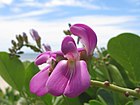Note: This is a project under development. The articles on this wiki are just being initiated and broadly incomplete. You can Help creating new pages.
Difference between revisions of "Canavalia rosea"
| Line 8: | Line 8: | ||
==Chemical Composition== | ==Chemical Composition== | ||
| − | <ref name="chemical composition"/> | + | It contains Tannins, Phlobatannins, Saponins, Flavonoids, Alkaloids, Cardiac glycosides and Phenolics.<ref name="chemical composition"/> |
==Common names== | ==Common names== | ||
| Line 58: | Line 58: | ||
==Photo Gallery== | ==Photo Gallery== | ||
<gallery class="left" caption="" widths="140px" heights="140px"> | <gallery class="left" caption="" widths="140px" heights="140px"> | ||
| − | + | Bay Bean (Canavalia rosea) (15836265452).jpg | |
| + | Canavalia rosea 2 (8625881277).jpg | ||
</gallery> | </gallery> | ||
Revision as of 17:47, 27 March 2021
Canavalia rosea is a perennial herb with a trailing or climbing stem growing 2 - 10 metres long and becoming somewhat woody with age. The plant is sometimes harvested from the wild for local use as a food and medicine.
Contents
- 1 Uses
- 2 Parts Used
- 3 Chemical Composition
- 4 Common names
- 5 Properties
- 6 Habit
- 7 Identification
- 8 List of Ayurvedic medicine in which the herb is used
- 9 Where to get the saplings
- 10 Mode of Propagation
- 11 How to plant/cultivate
- 12 Commonly seen growing in areas
- 13 Photo Gallery
- 14 References
- 15 External Links
Uses
Athlete Foot, Acne, Boils, Rheumatism.[1]
Parts Used
Chemical Composition
It contains Tannins, Phlobatannins, Saponins, Flavonoids, Alkaloids, Cardiac glycosides and Phenolics.[2]
Common names
| Language | Common name |
|---|---|
| Kannada | ತಮಟೇ ಬಳ್ಳಿ Thamate balli |
| Hindi | Guthari |
| Malayalam | Manal avara |
| Tamil | Koli-y-avarai |
| Telugu | Madana |
| Marathi | Sagar abai |
| Gujarathi | Adbau talwardi |
| Punjabi | NA |
| Kashmiri | |
| Sanskrit | |
| English | Beach bean, Bay bean |
Properties
Reference: Dravya - Substance, Rasa - Taste, Guna - Qualities, Veerya - Potency, Vipaka - Post-digesion effect, Karma - Pharmacological activity, Prabhava - Therepeutics.
Dravya
Rasa
Guna
Veerya
Vipaka
Karma
Prabhava
Habit
Identification
Leaf
| Kind | Shape | Feature |
|---|---|---|
| Ovate | Compound leaves |
Flower
| Type | Size | Color and composition | Stamen | More information |
|---|---|---|---|---|
| White | Inflorescence is raceme, Consisting of 10 to 20 flowers | {{{5}}} |
Fruit
| Type | Size | Mass | Appearance | Seeds | More information |
|---|---|---|---|---|---|
| Sword | 20-35 cm long and 3-6 wide | Reddish seeds | Each pods contains reddish seeds |
Other features
List of Ayurvedic medicine in which the herb is used
Where to get the saplings
Mode of Propagation
How to plant/cultivate
The seeds are buoyant and impermeable to water - they are thus able to float considerable distances in the sea, thereby explaining the plants wide distribution.[5]
Commonly seen growing in areas
[[:Category:Herbs that are commonly seen in the region of |]], [[:Category:Herbs that are commonly seen in the region of |]], [[:Category:Herbs that are commonly seen in the region of |]], [[:Category:Herbs that are commonly seen in the region of |]], [[:Category:Herbs that are commonly seen in the region of |]].
Photo Gallery
References
External Links
- [ ]
- [ ]
- [ ]
- Ayurvedic Herbs known to be helpful to treat Athlete Foot
- Ayurvedic Herbs known to be helpful to treat Acne
- Ayurvedic Herbs known to be helpful to treat Boils
- Ayurvedic Herbs known to be helpful to treat Rheumatism
- Herbs with Leaves used in medicine
- Herbs with Root used in medicine
- Herbs with common name in Kannada
- Herbs with common name in Hindi
- Herbs with common name in Malayalam
- Herbs with common name in Tamil
- Herbs with common name in Telugu
- Herbs with common name in Marathi
- Herbs with common name in Gujarathi
- Herbs with common name in English
- Habit - Perennial
- Index of Plants which can be propagated by Seeds
- Herbs that are commonly seen in the region of
- Herbs

